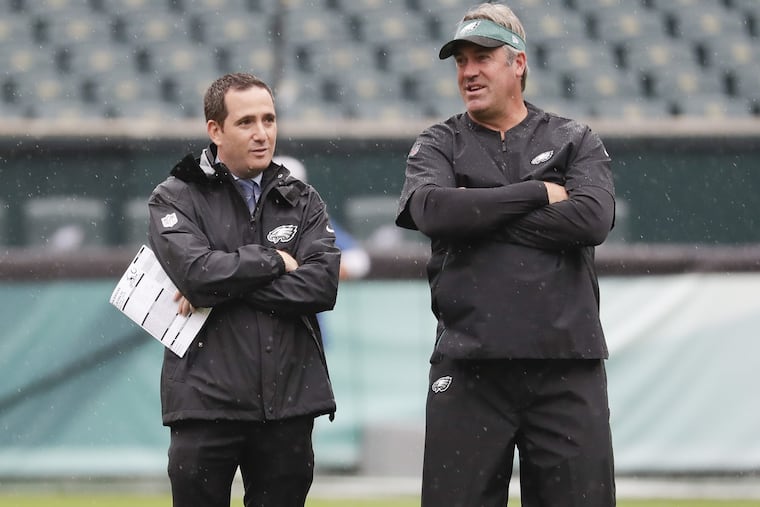Running back is a problem, but Eagles don’t need to pay a premium to address it | David Murphy
Elite running backs are rarely worth the investment. It's hard to imagine that the current market will prove an exception.

Do not invest significant assets in running backs. Write it down, print it out, embroider it in cross-stitch. And then hang it on the wall of your general manager's office. Because running backs are like field goals: You can't live without them, but rarely are they worth the investment.
It's as hard and fast as the rules of roster construction come, and Howie Roseman should pour a glass of wine and hum it like a mantra. Do not invest significant assets in running backs. Not in the draft, not in free agency, and most definitely not in both, which is what the Eagles would essentially be doing right now if they went out and traded for a legitimate solution to their current problem at the position.
Om.
As with any rule, there are exceptions. The Eagles might be facing one on Thursday night. The conventional wisdom says that a team such as the Giants should never draft the running back over the quarterback, but also that the quarterback is the Quarterback, and not Christian Ponder or Jake Locker or Blaine Gabbert. No, you do not draft Saquon Barkley over Baker Mayfield, Pat Mahomes, or Carson Wentz. But Sam Darnold and Josh Allen do not navigate a pocket the way any of those three do. Give me Barkley. Heck, give me anyone at any position who doesn't have the destructive impact that an illusion at quarterback does.
But this isn't a column about the Giants, or Darnold, or Allen. It's a column about exceptions to a rule, and the main point is that the Eagles' current situation does not count as one.
That's not to say that all is well on the home front. With Jay Ajayi sidelined for the season with an ACL tear, Darren Sproles laid up with a hamstring strain, and Corey Clement working his way back from a quad strain, the Eagles will head into Thursday night's NFC East showdown with two healthy running backs, one of whom is an undrafted free agent with seven career carries. The loss of Ajayi is particularly acute. While he never emerged as the workhorse back that some envisioned when the Eagles acquired him midway through last season, he brought a crucial element to the committee approach that Doug Pederson and his offensive coordinators took at running back.
"We're going to miss Jay's physicality, for sure," offensive coordinator Mike Groh said.
>> READ MORE: How Fletcher Cox's contract restructuring could help the Eagles nab a running back, perhaps LeSean McCoy?
Ajayi hits holes with a hard-nosed burst that nobody else in the backfield has. It's why the Eagles decided to trade a fourth-round pick for him last season. But trading a fourth-round pick is a lot different from trading a first- or second- or even third-round pick, and it's hard to imagine that anything outside that range would persuade the Steelers to let Le'Veon Bell walk or the Cardinals to give up David Johnson.
Those are two names that have crackled back and forth among Eagles fans as they've brainstormed solutions to the backfield woes. Bell, presumably, is more available than Johnson, given the dissatisfaction that the Steelers have expressed regarding his ongoing holdout. But even if Pittsburgh ends up relenting for a pick that tops out in the lower end of the first-through-third-round spectrum, acquiring the free-agent-to-be would require spending close to $12 million in salary-cap space that could otherwise be put to addressing the needs of future seasons.
In other words, trading for Bell would leave the Eagles exactly where they are right now, except with significantly fewer assets to invest in the variety of other needs that currently litter the roster.
Start with the draft pick. Over the last three years, the average NFL team has added an average of 10 players in the first three rounds of the draft. The Eagles have added just six, thanks to a variety of trades, most notably the one that landed them Wentz. Only one team in the NFL, the Rams, has made fewer selections in the first three rounds.
It's difficult to argue that the Eagles have been shortsighted in their dealing. I don't know whether you heard, but they won the Super Bowl last season, and among the players who played important roles were Ronald Darby (acquired for a third-rounder and Jordan Matthews), Tim Jernigan (third-round pick swap), and Wentz. Still, there's an argument to be made that those acquisitions came at the expense of young players who would be the next men up on the depth chart, both in the future and in the here and now.
At some point, the Eagles will need to develop a left tackle to replace Jason Peters. That could be Jordan Maialata. But that's no sure thing. Brandon Graham and Jordan Hicks are scheduled to hit free agency this season. Wentz could clearly use another weapon at receiver.
Within the context of the medium- and long-term future, those positions plus cornerback might be more important needs than running back. Last year, the Eagles won the Super Bowl with a fifth-round pick (Ajayi) and two undrafted free agents (Clement, LeGarrette Blount) getting the bulk of their carries.
The Eagles might need to do something to fix what is undisputedly a significant concern. But they faced a similar concern last season, and they did not need to cash in a valuable chip to address it. They'd be wise to chart a similar course this time around.